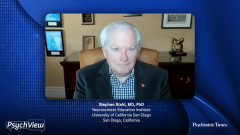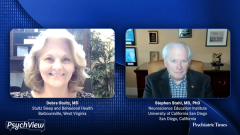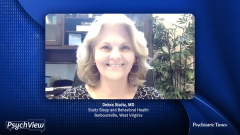
Symptoms of Narcolepsy: Excessive Daytime Sleepiness
In this custom video series, experts within the fields of sleep and neuroscience discuss sleep as a vital sign and causes, in addition to narcolepsy, for excessive daytime sleepiness.
Episodes in this series

Debra Stultz, MD: Let’s talk for a minute about the symptoms of narcolepsy. Everybody is most familiar with excessive daytime sleepiness. In fact, that’s the only symptom that you need to have the diagnosis of narcolepsy. These other symptoms go along with it and help you make the diagnosis, but you have to have only excessive daytime sleepiness. The problem is people use a lot of different words to describe excessive daytime sleepiness. “I’m really tired. I can’t function. It’s like I’m attached to the couch. I can’t get up in the morning.” They have all these symptoms for fatigue. It causes a great deal of irritability, but their descriptions are sometimes so vague that people don’t know what to do with it. It’s a very important symptom to listen to.
They present to primary care offices, psychiatrists, and neurologists with complaints of, “I can’t stay awake. I fall asleep unintentionally. I get sleepy when I’m driving.” That’s 1 question you can ask them: Have you had accidents? “I have to stay busy all the time, or I’m going to go to sleep.” That description gets psychiatrists thinking: Are they anxious? Are they bipolar? Are they staying busy all the time? That’s the way they’re trying to fight the sleepiness.
Stephen Stahl, MD, PhD: Sleep is like a vital sign in psychiatry. It goes off with lots of disorders, so you can be confused. Is this an anxiety disorder? Is this a mood disorder. A psychotic disorder? Because sleep is abnormal in those disorders. You say excessive daytime sleepiness. You can be excessively sleepy in the daytime from not sleeping at night, from burning the candle. It’s a common 1, but it’s not a pathological 1. It may be a lifestyle 1. But the big 1 is obstructive sleep apnea. If you’re not sleeping at night, you can have daytime sleepiness and not have narcolepsy. You have a different cause of it.
Debra Stultz, MD: People are tuned in to question for sleep apnea. Sometimes that’s as far as it goes, even in the sleep labs. And the thing of it is, sleep disorders are similar to psychiatric disorders. They run hand in hand: If you have 1 sleep disorder, you’re more likely to have another. Studies have shown about 6% of people with sleep apnea, and in some studies up to 30% of people with sleep apnea can have narcolepsy. Of those patients with narcolepsy, about 25% can have obstructive sleep apnea. I hope what we can do is to get people thinking of both disorders because sleep apnea and snoring are clues that people need to do a sleep study. But if they are sleepy, we need to keep looking.
Stephen Stahl, MD, PhD: Right. It’s not normal to want to sleep all the time.
Debra Stultz, MD: Absolutely.
Stephen Stahl, MD, PhD: Other things people look for: Are you sick? Do you have cancer? Do you have fatigue from mental disorder? You must rule all those out because they certainly can be making that fatigue, but they really don’t make you “asleep” so much.
Debra Stultz, MD: Yes, they make you feel tired, but you don’t sleep. That’s a good point.
Transcript edited for clarity.
Disclosures:
Dr Stephen Stahl is clinical professor of psychiatry and neuroscience at the University of California Riverside, adjunct professor of psychiatry at the University of California San Diego, and honorary fellow in psychiatry at the University of Cambridge. Over the past 12 months (January 2020 - December 2020), Dr Stahl has served as a consultant to Acadia, Alkermes, Allergan, AbbVie, Arbor Pharmaceuticals, Axovant, Axsome, Celgene, Concert, Clearview, EMD Serono, Eisai Pharmaceuticals, Ferring , Impel NeuroPharma, Intra-Cellular Therapies, Ironshore Pharmaceuticals, Janssen, Karuna, Lilly, Lundbeck, Merck, Otsuka, Pfizer, Relmada, Sage Therapeutics, Servier, Shire, Sunovion, Takeda, Taliaz, Teva, Tonix, Tris Pharma, and Viforpharma; he is a board member of Genomind; he has served on speakers bureaus for Acadia, Lundbeck, Otsuka, Perrigo, Servier, Sunovion, Takeda, Teva, and Vertex; and he has received research and/or grant support from Acadia, Avanir, Braeburn Pharmaceuticals, Eli Lilly, Intra-Cellular Therapies, Ironshore, ISSWSH, Neurocrine, Otsuka, Shire, Sunovion, and TMS NeuroHealth Centers.
Dr Debra Stultz is the Director and Owner of Stultz Sleep and Behavioral Health in Barboursville, West Virginia. Dr Stultz earned her medical degree from Marshall University School of Medicine in Huntington, West Virginia. She completed a residency in psychiatry and a fellowship in child and adolescent psychiatry through West Virginia University at their Charleston Division through Charleston Area Medical Center in Charleston, West Virginia. She is board certified in psychiatry, sleep medicine, and behavioral sleep medicine. With a special interest in Narcolepsy, she treats a variety of sleep disorders and psychiatric issues. She is also the editor for the Clinical TMS Society newsletter, on their Board of Directors, and the chairman of the TMS and Sleep Disorders Affinity Group. Dr Stultz is on the advisory committee for Harmony Biosciences and is a speaker for Harmony Biosciences and Jazz Pharmaceuticals.
Newsletter
Receive trusted psychiatric news, expert analysis, and clinical insights — subscribe today to support your practice and your patients.










